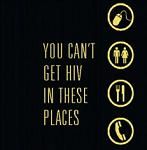Rights and Recourse defines their programme as one that aims to empower viewers by informing them of the law and their rights.

I’ve seen bits and pieces of promos for them and caught a few minutes of one programme before but never watched a show from start to finish. That’s mainly because it is aired at the most inappropriate time ever. Given that it is geared towards informing the average South African of their rights and recourse it’s crazy to be showing it between 12h00 and 13h00 daily.
I mean, most people are working away like happy or maybe not so happy Trojans, at that particular time of day, and the irony is that many may well need the advice and information that is dished out.
Take today’s show, which I managed to catch in its entirety simply because I was home at the time. It dealt with HIV and AIDS in the workplace.
Unless SABC 3 were seriously thinking most people with HIV/AIDS who work would be sick in bed today, I wonder how they expected this particular programme to reach their target audience.
Okay, so that’s my little rant out of the way. Let’s take a look at what they said.
Two guests were on the show; Chloe Hardy from the AIDS Law Project and Dr Clive Evian, who is an HIV/AIDS expert currently working in the HIV Clinic at the Johannesburg Hospital.
They looked at the specific issues of HIV testing, disclosure of status, discrimination in the workplace and obviously recourse for people who are unfairly treated at work because of their HIV status.
Basically they referred to the Code of Good Practice for the Handling of HIV in the workplace. While this is not law it is a document which prescribes guidelines for employers who are faced with the reality of having employees with HIV and AIDS in the workplace. It helps them manage the situation fairly and also indicates what are considered to be the best practices in this regard.
Some of the hardcore legalities surrounding HIV and AIDS in the workplace are that employers cannot force employees to be tested for the virus. However there is consensus that employers should encourage staff to be tested, not as a means to working them out of the company but as a way of determining at an early stage if employees are infected and then ensuring that they do get treatment.
Interestingly, should an employer want to get an indication of the percentage or number of people in their employ who have the virus, they can require all staff to be tested. However, they will not be able to be told who has the infection, simply the number of people who do. It was recommended that should this be the case, it is advisable for employees to take the test voluntarily. Obviously all HIV testing is subject to counseling.
I have to say what I liked about this particular show was that while it dealt with the legal aspects, it didn’t turn into one of those programmes where you had two people adamantly drumming into you what your rights were and woe betide any employer who dared to mess with them.
Coming from a background in Human Resources I know how easy it is to be confronted with the radical over- the -top approach which is almost hostile and militant and which simply spurs people on to push their rights without considering their responsibilities as well.
This took a much more balanced approach. However to give credit I think the balance came more from the doctor than the person from the AIDS Law Project who was clearly one of those “I know the law and I advise that if in doubt, take action,” types.
For example she indicated that employers were not entitled to force employees to divulge their status and in fact she recommended that people didn’t ever reveal their status.
The doctor on the other hand suggested a different approach. He said, if you have an employer who is supportive and who is sensitive, it might be wise to reveal your positive HIV status simply because it takes unnecessary pressure and anxiety away from you and allows the employer the opportunity to assist and provide support.
He also said that he was in favour of people getting tested early, because the earlier the virus is detected, the quicker they can get treatment and get fit and healthy again. Of course, he cautioned that if someone believed their employer might not be supportive then obviously it was not a good idea to disclose their status. Dr Evian agreed that while some employers are still in the Dark Ages, many are more enlightened; they have implemented education awareness programmes and are supportive of employees who have the virus. He stressed that South Africa has moved into the treatment phase, that treatment is available and that we need to break the veil of silence.
I kind of liked his no nonsense and proactive approach. And he was not shy about being “politically incorrect.” He stated categorically that the reason we have such a high rate of HIV and AIDS infection in South Africa ( 5.5 million infections at present) is because we have no leadership in our country. He said in other African countries where they were making progress in reducing HIV figures, the President or Head of the countries were completely unambiguous about HIV and it’s spread.
But back to testing - the important points are that testing is voluntary and that disclosure of status after testing is also voluntary. In addition counseling has to be part and parcel of testing.
In terms of sick leave entitlement, the amount of leave prescribed in terms of the Basic Conditions of Employment Act applies. In essence that is usually 30 days in a three year sick leave cycle. Employers are entitled to request a doctor’s certificate for any periods in excess of two days and they are under no obligation to give additional sick leave after the sick leave in a particular cycle is exhausted. However, if employees have annual leave they can request that to be used before going onto unpaid leave.
Of course discrimination, harassment or prejudice of any kind is not allowed towards an employee who has, or is suspected of having HIV or AIDS. This includes discrimination by co-workers or by managers. In situations where this occurs it was recommended that the first step is to take up a grievance with the company against the perpetrator and should it not be resolved then the employee has recourse to the CCMA where they may declare a dispute on the grounds of an unfair labour practice.
The issue of dismissal was also raised. Dismissing an employee simply on the basis of their HIV or AIDS status is unfair, but it seems the situation gets a bit grey when it comes to an employee being too sick to fulfill their contractual obligations. In cases like that usually there would be attempts to go for incapacity benefits or the like. Obviously this would only be considered fair if the person was too ill to work. Attempting to put a worker on incapacity pension when they are still fit is unfair practice.
Emphasis was placed on the fact that HIV is not a risk in the workplace and is not like a contagious disease that spreads at work.
They reiterated that it is spread by blood, bodily fluids and sex. In the unlikely event of there being any exposure to these in the workplace, universal safety precautions should be carried out:

Don’t touch anyone else’s blood. Use gloves whenever cleaning up body fluids and clean up blood spills with bleach. They didn’t mention sex at work, but you know the drill; use a condom.
HIV cannot be caught from tea cups, toilets, telephones or using a pen that an infected person has used.
Other points of interest were:
At present smaller companies are more problematic in respect of discrimination against workers with the virus. Larger companies are more inclined to have policies in place, HR Departments and awareness campaigns and are more supportive, or less discriminatory towards workers living with the virus.
Domestic and farm workers are at greater risk of discrimination.
There have only ever been two cases recorded where a doctor with HIV has infected a patient. The one was a dentist in Florida USA who apparently maliciously infected someone and the other case was an Orthopedic Surgeon in France who somehow passed on the virus.
Rights and Recourse allows for people to phone in with questions or comments, so public participation is encouraged.
One woman called in and said she was HIV positive but at an advanced stage. She said, in her experience, while you are not compelled to disclose your status, as you get more ill it becomes imperative to disclose to your employer since your work performance may decline. If you are in a position of responsibility or doing a pressurized job you owe it to them to be aware of your situation so it does not hamper work processes. I thought she was brave and very responsible to come out and make that recommendation.
Another question around whether you can be tested for HIV by using saliva turned out to be interesting. Apparently HIV antibodies which fight the virus are present in saliva if you have HIV in your blood.
Doctor Evian said that HIV transmission via saliva “is almost unheard of.”
So all in all it was an informative and educational programme. Obviously for those living with the virus, knowing their rights in the workplace is critical. But it also went some way to reassuring those who don’t have the virus that it’s damn near impossible to contract it in the workplace and provided some extra information on HIV and AIDS in general.
During the show a poll was conducted to which people could text their yes or no answers. What was great about that was that they gave the results at the end of the show.
The question was:
“Do you think you should know the HIV status of your co-workers?”
40% said Yes
60% said No
What do you say?
So, check this programme out if you happen to be lazing at home between 12h00 and 13h00 on weekdays. You might get some good advice. And greater insight into the law.
I’ll try and catch it from time to time and let you know more about your rights and recourse.